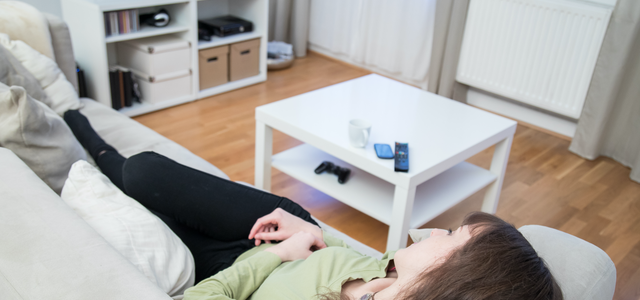
Listen to TV or podcasts to fall asleep? This can affect the quality of sleep, but it doesn’t have to. What matters in the end.
The day is done. Now it’s time to relax and recharge your batteries for tomorrow. Many are looking for relaxation by making themselves comfortable on the sofa with a series, podcast or audio book. And boom – you dozed off.
Does this have a negative effect on the quality of sleep later in bed? “That cannot be said in general terms,” says Prof. Thomas Penzel. He is scientific director of the interdisciplinary sleep medicine center at the Berlin Charité.
In the so-called light sleep phase, the central nervous system is still confronted with external stimuli that it has to process. “Whether that’s good for you or not varies from person to person,” says Penzel.
Every body is different
Torsten Grüttert, specialist in psychiatry in Duisburg, sees it similarly. “It may well be that staying asleep is more difficult because the brain is still busy processing what it sees or hears,” he says.
And there are studies that indicate that too much blue light, for example from tablets or smartphones, can impair sleep quality. The reason: the blue light color inhibits the production of melantonin, a hormone that makes us tired when it’s dark.
“Blue light keeps you awake longer, while reddish light makes it easier and faster to fall asleep,” explains Penzel.
The ideal case: After dozing off, quickly to bed
According to the experts, it is clear that sleep with series, podcasts or audio books in the ear is less deep overall. There are several phases of sleep, including light sleep, deep sleep and dream sleep. “The light sleep phase is probably longer in front of the television,” says Thomas Penzel. Whether this reduces the feeling of having had enough sleep the next day again depends on the individual case.
“Of course, it’s ideal to wake up on the sofa after dozing and then sleep soundly in bed.” True to the motto: deep sleep definitely belongs in bed.
Find calm again after waking up
But anyone who has ever woken up in the middle of the night with the television on knows that this is not always possible. You often feel excited and don’t calm down so quickly.
In such moments, relaxation exercises can help. The German Sleep Foundation, for example, recommends deep abdominal breathing: To do this, rub both palms together for a while. This generates heat. Now place your hands on your stomach, below your belly button. Breathe in and out deeply and feel the abdominal wall rise and fall.
Another possibility: “Stay in bed and realize: My heart is beating calmly and evenly,” says Torsten Grüttert. That too can be relaxing.
The problem with the alarm clock
There can be another downside to regularly falling asleep using only the ritual of the TV, podcast, or audio book. Because then you run the risk of no longer perceiving the clock radio as an alarm clock in the morning.
How to make sure you wake up after all? A tip from Torsten Grüttert: “In addition to the radio alarm clock, use a regular alarm clock with a shrill, unpleasant sound.”
Find a helpful bedtime ritual
So there are good reasons to question your sleeping habits – especially if you have found that dozing off in front of the TV or with headphones in your ears is not that good for you.
An interesting film or an exciting podcast can have a relaxing effect. But as soon as you fall asleep on it, it’s over. “This is especially true if you are not so rested the next day because of poor sleep at night,” says Grüttert.
So part of the solution is: a clear separation between media consumption and the phase in which it is really about falling asleep. “Here it can be a good idea not to make yourself so comfortable while watching TV or podcasts,” says Torsten Grüttert. That can mean: Instead of lying on the softly upholstered couch, you sit on the harder chair.
Another possibility can be to ask other people in the room, for example partners, to wake you up when you doze off. Or: “You set yourself a timer,” says Thomas Penzel. The television or tablet will then switch off automatically after 30 or 60 minutes.
So if you have achieved a certain basic relaxation thanks to TV, podcasts or audio books, you can then promote falling asleep in bed. And with little rituals. According to the specialist, these could consist of a cup of hot milk with honey, a foot bath or autogenic training.
“Even a pleasant smell in the bedroom or on the bed linen can have a relaxing effect,” says Grüttert. This can be lavender, your favorite perfume or maybe just the smell of the washing powder that sticks to the laundry.
“It’s also important not to eat too much or too much calories before going to bed,” says Grüttert. And don’t drink too much either – otherwise there is a risk that it will not be possible to sleep through the night because you have to go to the toilet at night.
Which routine helps you get a good night’s sleep is very individual – television, podcasts or audio books can be part of it. Although it doesn’t necessarily have to be horror films or thrillers. Ultimately, the following applies: “Just try it out,” advises Penzel.
Read more on Techzle\.com:
- Heat, muggy, ozone: expert explains “unpleasant weather cocktail”
- Study: How man shifted the Earth’s axis
- “Full to overfull”: Pro Bahn warns of summer